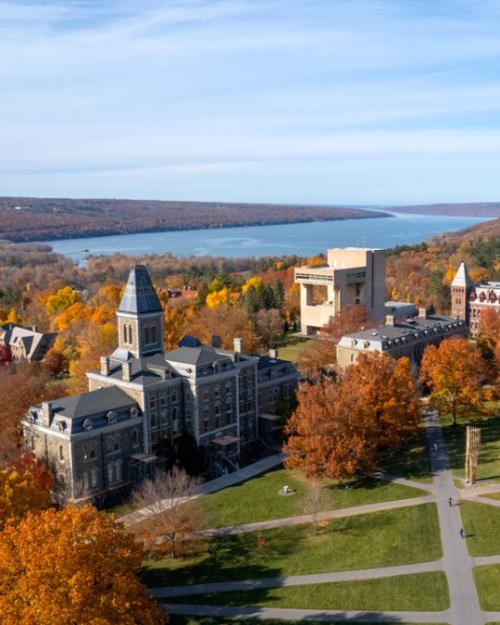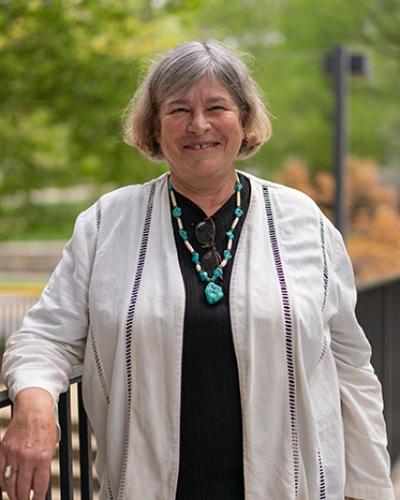Scroll down for interview
Throughout her 40-year career, Dr. Susan Rose (Cornell Ph.D. ’84) made a lasting impact on her undergraduate alma mater, Dickinson College. Dr. Rose served as the Charles A. Dana Professor of Sociology and director of the Community Studies Center and Mosaics Program. Over the years, she has received numerous awards for her teaching, including the Michael Harrington Distinguished Teaching Award from the National Poverty Forum and the SSSP. Her work explores American studies, history, and the Sociology of religion, gender, violence, education, and immigration.
Among her many achievements, Dr. Rose is a founding member of Dickinson’s American and Global Mosaics Program, which emphasizes interdisciplinary fieldwork in partnership with diverse communities. Mosaics encourages students to think reflexively about the diverse world in which they live as they engage in collaborative work with local, transnational and international communities--providing a rich pedagogical experience.
Students and faculty complete field research alongside community partners, inspiring shared knowledge, and ultimately working towards greater equality, peace, social justice. The Mosaics provide opportunities for students “to apply what they are learning in the classroom—both theoretically and methodologically—to the world beyond and to bring their experiences in the world back into the classroom,” a mission central to Susan Rose’s pedagogical philosophy.
For example, prior to fieldwork, students in the Nepal program focus on concepts such as climate change and policy, and during their three-week immersion, they meet with government officials, scholars, environmentalists, NGO activists and people in rural villages. Upon return, students process what they learned, and create a report that ultimately will be of use to the government of Nepal.
Susan Rose has also co-created several documentaries, produced by the Community Studies and Mosaics Program at Dickinson College.
In one of her documentary films, “The Lost Ones: Long Journey Home,” Rose and her student Manuel Saralegui tell the story of two indigenous children captured by the 4th U.S. Cavalry on the Texas-Mexico border in 1877. The children were brought to the Carlisle School in Pennsylvania, the first off-reservation boarding school in the U.S. The project led to the publishing of the 2016 book, “Carlisle Indian Industrial School: Indigenous Histories, Memories, and Reclamations,” with Rose as a co-editor.
Dr. Rose was also instrumental in the creation of the Carlisle Indian School Digital Resource Center, which continues to digitize and catalog important pieces of historical knowledge. Rose also worked on the Global Clothesline Project, a visual display “bearing witness to violence against women,” exemplifying her commitment to both collaborative and socially conscious work and activism. Professor Rose produced a Clothesline Project documentary and wrote her 2013 book titled “Challenging Global Gender Violence: The Global Clothesline Project” in connection to this work.
Professor Rose is also the author of “Keeping Them Out of the Hands of Satan: Evangelical Schooling in America,” and co-author of “Exporting the American Gospel: Global Christian Fundamentalism.”
Upon her retirement in 2023, the Dickinson College community came together to acknowledge and celebrate Susan Rose’s extraordinary legacy and lasting impact on the University and the lives of her students and colleagues, as well as to formally announce (a surprise to Rose) the Susan D. Rose Prize for Excellence in Community Based Research and Scholarship.
In a conversation with Professor Susan Rose, she shared a bit about her time at Cornell, where she earned her P.h.D. from the Sociology Department in 1984:
What inspired you to choose Cornell for pursuing your Ph.D.?
I chose Cornell because of its excellent reputation, the faculty in Sociology, and the ability to take classes in various departments. This flexibility enabled me to take classes in Human Development and Family Studies (HDFS), have faculty on my dissertation committee from HDFS and Anthropology as well as Sociology and to do research with a Professor at the Law School.
Can you share a favorite memory or moment from your time at the University?
I loved being in the outdoors, biking and cross-country skiing – and writing half of my dissertation under the willow trees at Stewart Park. I really enjoyed concerts at Sage Hall and having potlucks with friends from many different departments. I also really appreciated the training I got in the Freshman Seminar workshops, which were relatively new then. Also, going up and down the floors of Uris Hall from the Soc floor to the computer room before SPSS was interactive – one data card and error at a time.
Which Cornell Sociology faculty mentors had a significant positive impact on your growth as a young scholar?
Prof. Robin Williams and Prof. Glen Elder were wonderful mentors. Both were instrumental in my growth as a scholar and were supportive in my choosing to do a qualitative-based dissertation while developing strong quantitative skills (thanks to both Prof. Elder and Prof. McGinnis). Prof. Rose Goldsen was also very active and engaging. In addition, I really appreciated the support of Prof. Joan Brumberg who served on my committee and offered very good advice and Prof. Bronfenbrenner for whom I did research.
How did your focus and work while at Cornell shape your academic interests and the trajectory of your career?
The teaching and research I did at Cornell developed my interest in and commitment to mixed methods, employing both qualitative and quantitative methods. The work of Elder and Bronfenbrenner inspired my work in life course studies and the ecology of human development. Prof. Williams work and support enabled me to engage in interdisciplinary research, deepening my interests in sociology while drawing upon the research literatures in religion, education, family studies, gender, American studies, history, and the law.
What are the underlying motivations of your research and what aspects are you most passionate about?
Inequality – how structural forces and policy shape individual life choices and chances.
What is a challenge you faced in your career and how did you face and overcome the challenge?
I have had the privilege of studying at Cornell and then teaching and doing research at a small, highly selective liberal arts college where I could explore and develop wide-ranging interests. I love the interaction with students and seeing their development from first year to senior year while also being able to do serious research. The only challenge – finding time to do it all! And work-family balance – when I first got to Dickinson in 1984, there was no maternity or parental leave nor day care – but we changed that fairly quickly with great colleagues, an increasing number of women on the faculty, and a supportive administration.
Can you share a career milestone or achievement that you are particularly proud of?
Michael Harrington Distinguished Teaching Award, Society for the Study of Social Problems and the National Poverty Forum (2003)
Director of Community Studies and Mosaics at Dickinson College
Ability to publish books, articles, and produce films
Outside of your research and teaching, what are some of your favorite hobbies and what keeps you busy?
Cooking, hiking, traveling.
How are you enjoying retirement? Any exciting plans or goals for the next few years?
I LOVE IT – and I find, somewhat surprisingly, that I am very good at retiring 😊 Jubilante!
I have always read fiction as well-being immersed in non-fiction but for the first time I am reveling in detective novels.





